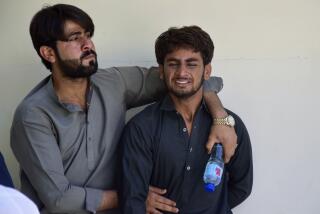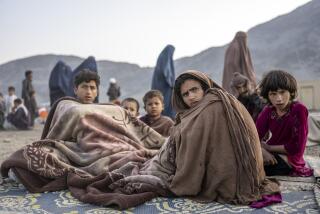Pakistan Arrests Hundreds of Islamic Militants
ISLAMABAD, Pakistan — Security forces have detained hundreds of members of militant Islamic groups over the last two days that neighboring India accuses of launching terrorist attacks in Kashmir, Interior Ministry officials said Monday.
Pakistani authorities also closed and sealed offices belonging to the groups in many areas of the country as part of an effort to halt armed forays into the Indian-held part of Kashmir. Those attacks, plus an assault Dec. 13 on the Parliament building in New Delhi, have increased tensions along the India-Pakistan border and brought the two nuclear-armed nations to the brink of war in recent weeks.
The crackdown was viewed in Pakistan as the start of a larger effort by President Pervez Musharraf to rein in Islamic groups that promote violence as a means of ending Indian control over a portion of the disputed Kashmir region.
In a major television address to his people, Musharraf announced Saturday his intention to shut down the groups, citing the need to end a so-called “Kalashnikov culture” of violence, a reference to a popular Russian-made assault rifle.
Five organizations were banned. Two of the outlawed groups, Jaish-e-Mohammed and Lashkar-e-Taiba, were accused by Indian authorities in the attack on Parliament.
There was no immediate response from India to the wave of detentions. Indian officials have demanded that Musharraf match his tough anti-extremist rhetoric with concrete actions.
A high-level Pakistani Interior Ministry official, who declined to be identified, said criminal charges most likely will be brought against most of those detained. He added, however, that some activists had been placed in preventive detention in hopes of cooling the tensions between the nations.
“This is not an operation where they will all be free again in a few days,” the official said.
Some reports said that more than 1,000 people had been detained so far, but officials cautioned against trying to put numbers on an action that was not yet over.
“It’s ongoing,” the Interior Ministry official said. “To put a number on it would be wrong.”
Political specialists in Pakistan believe that the crackdown is a serious attempt to crush Islamic militant groups. It is a step Musharraf had wanted to take for some time but couldn’t, they say.
“These are not token steps; this is serious,” said Rasul Bakhsh Rais, a Central Asia regional specialist at Quaid-i-Azam University in Islamabad.
Rais said he believed that two factors have enabled Musharraf to launch the crackdown:
* Newfound support from abroad after his backing of the U.S.-led war on terrorism has given the president greater leverage to deal with domestic adversaries.
* Hard-line Islamic groups have suffered an erosion of popularity.
“People in Pakistan are sick and tired of them,” Rais said. “They only cause us trouble.”
The White House said Sunday that President Bush had called Musharraf and Indian Prime Minister Atal Behari Vajpayee, urging them to settle their differences peacefully. Secretary of State Colin L. Powell is due to visit both countries this week during a brief trip to the region.
Aside from wanting to diminish the prospect of two nuclear-armed nations squaring off, U.S. officials are concerned that the tensions have led Pakistan to shift thousands of troops from its rugged western frontier with Afghanistan, where they could help search for Osama bin Laden.
More to Read
Sign up for Essential California
The most important California stories and recommendations in your inbox every morning.
You may occasionally receive promotional content from the Los Angeles Times.










